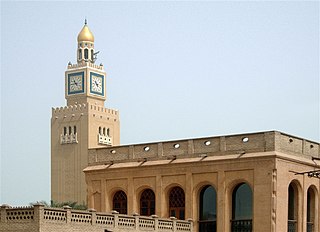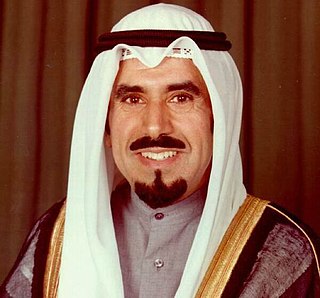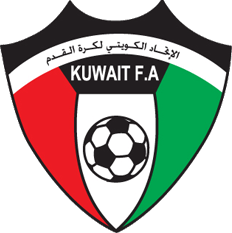Kuwait is an Arabian country.
Contents
Kuwait may also refer to:
Kuwait is an Arabian country.
Kuwait may also refer to:
Kuwait is a sovereign state in Western Asia located at the head of the Persian Gulf. The geographical region of Kuwait has been occupied by humans since antiquity, particularly due to its strategic location at the head of the Persian Gulf. In the pre-oil era, Kuwait was a regional trade port. In the modern era, Kuwait is best known for the Gulf War (1990–1991).

The Kuwaiti oil fires were caused by the Iraqi military setting fire to a reported 605 to 732 oil wells along with an unspecified number of oil filled low-lying areas, such as oil lakes and fire trenches, as part of a scorched earth policy while retreating from Kuwait in 1991 due to the advances of US-led coalition forces in the Gulf War. The fires were started in January and February 1991, and the first oil well fires were extinguished in early April 1991, with the last well capped on November 6, 1991.

Kuwait City is the capital and largest city of Kuwait. Located at the heart of the country on the south shore of Kuwait Bay on the Persian Gulf, it is the political, cultural and economic centre of the emirate, containing Kuwait's Seif Palace, government offices, and the headquarters of most Kuwaiti corporations and banks. It is one of the hottest cities in summer on earth, with average summer high temperatures over 45 °C (113 °F) for three months of the year.

The Gulf War was an armed conflict between Iraq and a 42-country coalition led by the United States. The coalition's efforts against Iraq were carried out in two key phases: Operation Desert Shield, which marked the military buildup from August 1990 to January 1991; and Operation Desert Storm, which began with the aerial bombing campaign against Iraq on 17 January 1991 and came to a close with the American-led liberation of Kuwait on 28 February 1991.
The Gulf War (1990–1991) was an armed conflict between Iraq and a multinational military coalition led by the United States, triggered by the Iraqi invasion of Kuwait in August 1990.

National guard is the name used by a wide variety of current and historical uniformed organizations in different countries. The original National Guard was formed during the French Revolution around a cadre of defectors from the French Guards.
Faisal, Faisel, Fayçal or Faysal is an Arabic given name. Faisal, Fayçal or Faysal may also refer to:

Sheikh Jaber Al-Ahmad Al-Jaber Al-Sabah or Jaber III was Emir of Kuwait from 31 December 1977 until his death in 2006.

The Kuwait national football team is the national team of Kuwait and is controlled by the Kuwait Football Association. Kuwait made one World Cup finals appearance, in 1982, managing one point in the group stages. In the Asian Cup, Kuwait reached the final in 1976 and won the tournament in 1980.

The Iraqi invasion of Kuwait began on 2 August 1990 and marked the beginning of the Gulf War. After defeating the State of Kuwait on 4 August 1990, Iraq went on to militarily occupy the country for the next seven months. The invasion was condemned internationally, and the United Nations Security Council (UNSC) adopted numerous resolutions urging Iraq to withdraw from Kuwaiti territory. The Iraqi military, however, continued to occupy Kuwait and defied all orders by the UNSC. After initially establishing the "Republic of Kuwait" as a puppet state, Iraq annexed the entire country on 28 August 1990; northern Kuwait became the Saddamiyat al-Mitla' District and was merged into the existing Basra Governorate, while southern Kuwait was carved out as the all-new Kuwait Governorate. By November 1990, the adoption of UNSC Resolution 678 officially issued Iraq an ultimatum to withdraw unconditionally by 15 January 1991 or else be removed by "all necessary means" from Kuwaiti territory. In anticipation of a war with Iraq, the UNSC authorized the assembly of an American-led military coalition.
Nasr, Al-Nasr, Al Nasr, An-Nasr, or An Nasr with the definite article Al- and An- means "The Victory".
Al-Rashid, ar-Rashid, Al-Rasheed or Al Rasheed may refer to:
Al-Shabaab or Al-Shabab is an Arabic phrase meaning "the Youth". It may refer to:

Radhi Shenaishil Swadi is a former Iraqi footballer and former coach of the Iraq national football team, and currently manages Iraq U23.
Najma or Al-Najma may refer to:
Kuwait is a group of approximately 40 paintings made by Nabil Kanso in 1990–91 on the Gulf War and Iraq’s invasion of Kuwait. The works in the series were first exhibited in Kuwait in March – April 1992 at the Free Atelier Art Center and traveled in June to Caracas for a special exhibit at the Palacio de Gobierno in honor of the Emir of Kuwait’s visit to Venezuela. Then, the exhibition proceeded to Geneva and was held at the Red Cross Museum in July – August 1992.
Nasr means victory in Arabic. Accordingly, many Arab sports clubs are called Nasr or Al Nasr.
The timeline of the Gulf War details the dates of the major events of the 1990–1991 war. It began with the Iraqi invasion of Kuwait on 2 August 1990 and ended with the Liberation of Kuwait by Coalition forces. Iraq subsequently agreed to the United Nations' demands on 28 February 1991. The ground war officially concluded with the signing of the armistice on 11 April 1991. However, the official end to Operation Desert Storm did not occur until sometime between 1996 - 1998. Major events in the aftermath include anti-Saddam Hussein uprisings in Iraq, massacres against the Kurds by the regime, Iraq formally recognizing the sovereignty of Kuwait in 1994, and eventually ending its cooperation with the United Nations Special Commission in 1998.
Qahtan and Qahtani (Kahtani) or with the definite article al- as Al-Qahtani (Al-Kahtani) meaning coming from Qahtan may refer to:
Al-Tadamon SC may refer to: